
Latest News Regarding
Horn of Africa
Somali commandos arrive home after training in Turkey
Somali commandos arrive home after training in Turkey
Source: Yenisafak
Sunday December 5, 2021
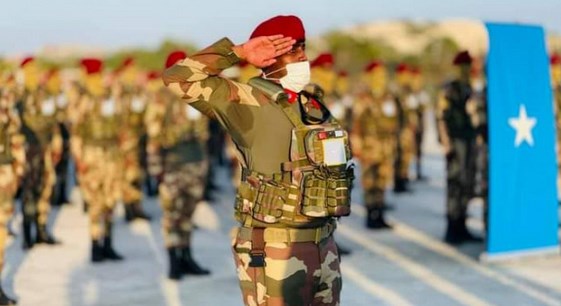
Over 100 Somali Gorgor (Eagle) commandos trained by the Turkish Armed Forces arrived home on Saturday.
The Somali National Army’s (SNA) infantry forces commander Mohamed Tahlil Bihi and senior government officials received the elite force personnel at the Adan Adde International Airport in the capital Mogadishu.
advertisements
Military officials told Anadolu Agency that the troops received modern commando training in Isparta, Turkey, and will be deployed on the frontline to fight against the al-Qaeda affiliated terrorist group al-Shabaab.
Turkey has been training Somali soldiers for the last four years as part of a 2010 military training cooperation agreement.
Since a groundbreaking visit by Turkish President Recep Tayyip Erdogan in 2011, Turkey and Somalia have enjoyed deep-rooted relations spanning several fields.
Ethiopia’s war in uncertain phase after Abiy’s advance
Ethiopia’s war in uncertain phase after Abiy’s advance

Source: AFP, Sunday December 5, 2021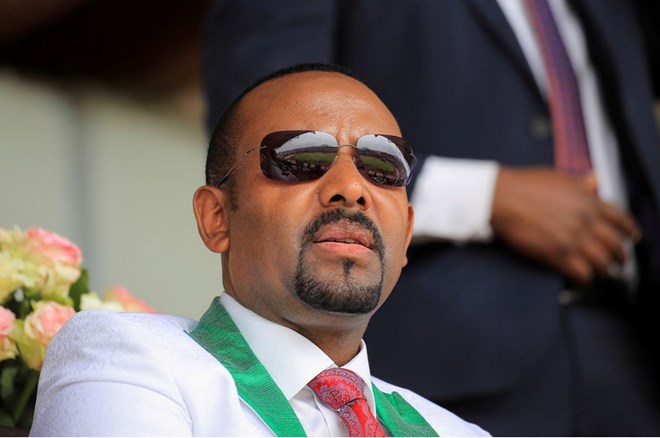
Ethiopia’s military this week regained control of territory previously claimed by Tigrayan rebels, a potential validation of Prime Minister Abiy Ahmed’s decision to join soldiers to conflict-hit areas.
advertisements
Yet how the government scored its wins and what they mean for an eventual outcome in the year-old war remain points of fierce debate as fighting enters a new, uncertain phase.
Just a month ago, the Tigray People’s Liberation Front (TPLF) rebel group appeared to be on the offensive, claiming to have captured Dessie and Kombolcha, towns on a key highway headed towards the capital Addis Ababa.
They reportedly reached as far as Shewa Robit, around 220 kilometres (135 miles) northeast of Addis Ababa by road.
advertisementsBut after Abiy announced last week he would lead operations in the field, the government announced a string of victories and the rebels acknowledged making adjustments to their strategy.
State media has responded with triumphalist wall-to-wall coverage.
“The enemy is destroyed, disintegrated,” the Ethiopian Broadcasting Corporation quoted Abiy as saying Thursday.
There’s little doubt the government can claim to have the “upper hand” in specific areas, said Awet Weldemichael, a Horn of Africa security expert at Queen’s University in Canada.
“Only time will tell if these can be translated into [the] upper hand in the war,” he said.
– A surprise shift –
The war in northern Ethiopia broke out in November 2020 when Abiy sent troops to topple the TPLF — a move he said came in response to TPLF attacks on federal army camps.
Though Abiy, the 2019 Nobel Peace Prize winner, promised a quick victory, by late June the TPLF had retaken most of Tigray, and it soon launched offensives into neighbouring Afar and Amhara regions.
The rebels’ march towards Addis sparked international panic, with a host of embassies urging their citizens to leave the country as soon as possible.
All the while, though, the exact nature of the TPLF advance was in dispute.
“I don’t know whether we should call it an advance,” one Western security official told AFP in mid-November.
“There’s not a huge column of tanks and armoured vehicles driving down the road towards Addis. It’s more complex than that. There are foot soldiers going into the mountains, they shoot and surround certain areas” but do not seem to fully control cities and towns, the official said.
The TPLF also never explicitly said it wanted to enter Addis Ababa, instead simply declining to rule out such a move.
The latest battlefield shifts unfolded swiftly.
The government first claimed towns in Afar, near a critical highway bringing goods to Addis Ababa, then on Wednesday it declared victory in Lalibela, a UNESCO World Heritage site that fell to the TPLF in August.
On Friday state media announced that towns on the road heading north towards Dessie and Kombolcha had been “liberated”.
The news could be a sign that government forces, as well as many thousands of new recruits who have enlisted in recent months, have more fight than they’ve gotten credit for.
“I was quite surprised by the latest counteroffensive by the government,” said Mehdi Labzae, a sociologist who studies land issues and mobilisation in Ethiopia.
“I have seen all the people who were mobilised… but the thing is I thought they were not trained and I thought they would just be destroyed.”
The path ahead
The African Union is trying to broker a ceasefire to avert further bloodshed, though there has been little progress so far.
The TPLF insists it will have the advantage in whatever fighting is to come.
“In battle, it’s known there will be adjustments and limited retreat as well as significant moves forward,” TPLF military boss Tadesse Worede said in an interview that aired Friday.
“We decided that to reduce problems and vulnerabilities in some areas we had reached, to leave some of those places voluntarily.”
For Labzae, such statements recall the government’s announcement that it was withdrawing from most of Tigray in late June — a claim that elided military setbacks even as TPLF fighters celebrated in the streets of the regional capital Mekele.
“They were so close [to Addis]. Why would they turn back now?” Labzae said of the TPLF.
“It means there was something worrying them or something that did not look good for them.”
One possibility, said Awet of Queen’s University, is that the government’s superior air power has turned the tide — at least for now.
“Drones are claimed to have played a decisive role in active combat, the full extent of which we are yet to find out,” he said.
“But so far, it appears like they have helped halt Tigrayan counterattacks and advances.”
European Parliament backs RSF’s call for moratorium on arrests of journalists in Somalia
European Parliament backs RSF’s call for moratorium on arrests of journalists in Somalia

Source: RF: Sunday December 5, 2021
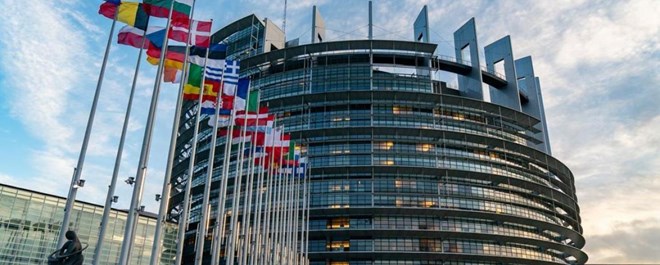
In a resolution on the human rights situation in Somalia adopted yesterday, the European Parliament has endorsed the call for a moratorium on arrests of journalists in Somalia that Reporters Without Borders (RSF) and its partner, the National Union of Somali Journalists (NUSOJ), issued more than a year ago and have been reiterating ever since.
The resolution “deplores the recent attacks on journalists and media personnel” and “calls on the Somali authorities to conduct and conclude investigations into the killings of all journalists during 2021.”
It then “urges the Federal Government of Somalia and its Federal Member States to declare, without delay, a moratorium on the arrest and imprisonment of journalists while performing their journalistic duties, as proposed by Reporters Without Borders and the National Union of Somali Journalists.”
“The prime minister undertook to declare this moratorium during a visit by RSF a year ago and this resolution serves to point out that the promise has not yet been honoured,” said Arnaud Froger, the head of RSF’s Africa desk.
“The authorities cannot be held responsible for all the major security problems that Somali journalists face, but they have the possibility of taking action, in particular by making the only too frequent arbitrary arrests and imprisonment of journalists illegal.”
At least 19 journalists have been arbitrarily arrested and jailed in connection with their work since the start of the year, according to the tally kept by RSF and NUSOJ. Two journalists have also been murdered by Al-Shabaab, a terrorist group affiliated to Al-Qaeda.
The latest was Radio Mogadishu director Abdiaziz Mohamud Guled, who was killed on a street in the Somali capital on 20 November by a suicide bomber with an explosive vest.
Somalia is ranked 161st out of 180 countries in RSF’s 2021 World Press Freedom Index.
Sudanese and Ethiopian forces clash in disputed border region
Sudanese and Ethiopian forces clash in disputed border region
Source: Hiiraan Online, Sunday November 28, 2021
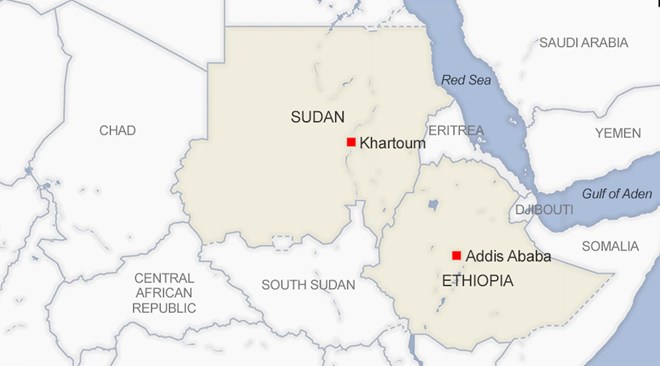
Sudan’s military said its forces clashed with Ethiopian troops and allied militia forces after they entered a disputed region on Saturday.
The Sudanese forces inflicted heavy losses of life and hardware during the fighting in the Al Fashaqa Al Sughra region, the military said.
The army said the Sudanese side suffered a “number of martyrs”, without giving specific details. However, Reuters quoted military sources as saying six Sudanese soldiers were killed.
These were the first clashes in months in Al Fashaqa.
advertisements
The two sides fought a series of battles there late last year when Sudanese troops moved in to regain control of the fertile enclave long settled by Ethiopian farmers, who are protected by government-aligned militias.
Sudan and Ethiopia held low-level talks to settle the border dispute but no agreement was reached. Ethiopia says Al Fashaqa is part of its territory.
The two countries, bound by strong social and cultural ties, are also at odds over a large hydroelectric dam being built by Ethiopia near its border with Sudan.
Khartoum is demanding that Addis Ababa shares live information on the operation and filling of the Grand Ethiopian Renaissance Dam to avoid flooding and ensure that work on its own power-generating dams on the Blue Nile is not disrupted.
Ethiopia has assured Sudan that the dam would cause it no harm but has not yet offered concrete proposals on co-ordination with Khartoum
Western Governments Comment on Joint UN-Ethiopian Human Rights Investigation
Western Governments Comment on Joint UN-Ethiopian Human Rights Investigation
Source: The US Department of State released on 6 November 2021 a “Joint Statement on the Release of the OHCHR-EHRC Joint Investigation.”
It reflects the view of 16 Western governments on the joint human rights investigation published by the UN High Commissioner for Human Rights and the Ethiopian Human Rights Commission concerning human rights abuses and atrocities in Ethiopia.
Labels: atrocities, civil war, Eritrea, Ethiopia, Ethiopian Human Rights Commission, human rights, OHCHR, TPLF, US
Restoring Sudan’s Democratic Transition
Restoring Sudan’s Democratic Transition
Source: The International Crisis Group (ICG) posted on 5 November 2021 an analysis titled “After the Coup, Restoring Sudan’s Transition” by Jonas Horner.
An ICG expert outlines de-escalatory steps that could reinstate the constitutional order and reset Sudan’s transition.
Labels: Abdalla Hamdok, Abdel Fattah al-Burhan, Arab League, AU, coup d’etat, Egypt, Forces for Freedom and Change, Israel, protests, state of emergency, Sudan, UAE, UN, US
Finland urges citizens to leave Ethiopia immediately
Finland urges citizens to leave Ethiopia immediately

Source: YLE Uutiset, Saturday November 6, 2021
So far only about 30 Finns have said they plan to leave the war-torn nation.
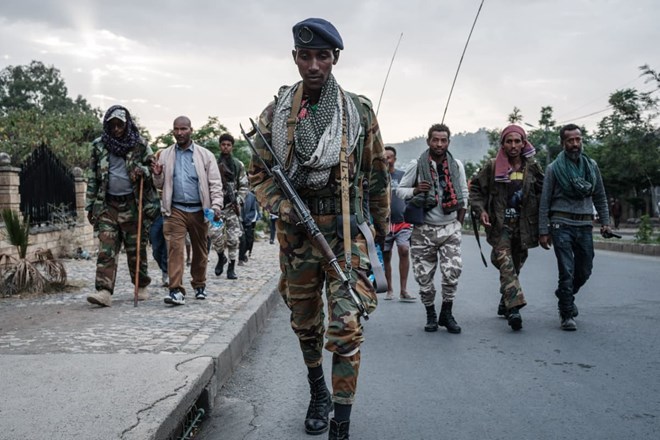
Tigrayan rebels are moving towards the capital, Addis Ababa. Image: Lehtikuva
The Finnish Foreign Ministry has urged all Finns in Ethiopia to leave the country immediately. Since the announcement on Friday, about 30 Finns have notified the ministry that they plan to leave the country within the next few days.
So far none of them have requested official assistance in leaving, as commercial flights are still departing from Ethiopia.
The East African country is sinking deeper into civil war as rebels approach the capital, Addis Ababa. A state of emergency has been declared in the country. The war, which has killed thousands of people and forced more than two million from their homes, has intensified in recent weeks.advertisements
According to the ministry, some 90 Finns had earlier filed notifications of plans to travel to Ethiopia.
The ministry is monitoring developments in the country with concern, said Helena Airaksinen, Deputy Director-General of the ministry’s Department for Africa and the Middle East, served as Finland’s ambassador to Addis Ababa from 2016 until last year.
“Situation may deteriorate unexpectedly”
“If people take up arms [against the rebels] at the prime minister’s urging, it may lead to very nasty situations,” she told Yle on Friday.
On Friday, an alliance of Ethiopian opposition factions set a goal of bringing down Prime Minister Abiy Ahmed by force or negotiation before forming a transitional government. Finnish President Sauli Niinistö met with Ahmed, a Nobel peace prize laureate, during an official visit to Ethiopia two years ago.
With the chaotic evacuation from Afghanistan fresh in memory, the ministry on Friday described the situation within the country as “very unstable”.
It noted that “developments in the country are difficult to predict and the security situation may deteriorate unexpectedly”. The ministry statement added that internet and SMS connections are often disrupted, while travel is hampered by roadblocks and violent protests.
Signs of hope
The EU, the UN and Finland are calling for an end to hostilities, the free movement of humanitarian aid, and the investigation of possible war crimes.
Finland has provided development aid to Ethiopia since the early 1960s. According to Airaksinen, it has been very effective and ongoing projects will be continued.
“We have continued water cooperation and direct assistance to schools, because we know that the assistance goes directly to its destination,” she said.
Airaksinen sees Ethiopia’s future as bleak, but adds that there have been hopeful changes in society.
“When the transition from an authoritarian to a more open system took place in 2018, many of the problems of the previous regime were left unaddressed. There was no reconciliation commission, although it might have been needed,” Airaksinen said.
“I hope that the cycle of violence can be broken and that we can return to the path of reform, even if it seems difficult. However, the crisis resilience of Ethiopians is incredibly strong. I hope that this will be resolved as soon as possible.”
Turkey says ready to mediate in ongoing Ethiopian war
Turkey says ready to mediate in ongoing Ethiopian war

Source: Hiiraan Online, Saturday November 6, 2021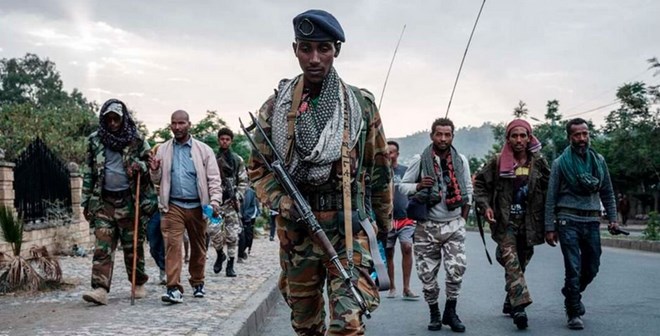
ISTANBUL (HOL) – Turkey has called for a ceasefire in Ethiopia and indicated it would be ready to mediate the sides in the year-long fighting that is now making headway into the capital.
A statement from the Foreign Affairs Ministry urged the ‘urgent cessation of the violence and call for the establishment of peace and stability. The Recep Erdogan administration also said it was ready to mediate between the Federal Government and the TPLF.
advertisements
The statement echoes similar calls by the US, UK, Belgium among a host of other western countries. Meanwhile, the UN Security Council called Friday for an end to the fighting and ‘for refraining from inflammatory hate speech and incitement to violence and divisiveness.”
The Security Council also “called for the respect of international humanitarian law, for safe and unhindered humanitarian access, the re-establishment of public services, and further urged the scaling up of humanitarian assistance.”
The United Nations has said that up to 7 million people in the Ethiopian regions of Tigray, Amhara and Afar need help, including 5 million in Tigray where some 400,000 people are estimated to be living in famine-like conditions.
Meanwhile the Ethiopian National Defense Forces (ENDF) Friday sent out an appeal to former soldiers to return to bolster defences against the Tigray Defence Forces (TDF).
The call is however based on a condition that the new conscripts must ‘recognise and accept the constitution of the Federal Democratic Republic of Ethiopia Constitution and believe in the sovereignty and unity of the people and are willing to serve with perseverance.’
Ethiopia: Anti-government Alliance Reportedly Formed
Ethiopia: Anti-government Alliance Reportedly Formed
Source: Reuters published on 5 November 2021 an article titled “Nine Ethiopian Factions to Form Alliance against Government.”
An alliance called the United Front of Ethiopian Federalist and Confederalist Forces has reportedly been created to oppose the Abiy Ahmed government. The Oromia Liberation Army and Agaw Democratic Movement have confirmed their participation. The other groups have not been named.
Labels: Abiy Ahmed, Agaw Democratic Movement, civil war, Ethiopia, Oromo Liberation Army, TPLF
Can Ethiopia Survive?
Can Ethiopia Survive?
Source: Foreign Affairs posted on 5 November 2021 an analysis titled “Can Ethiopia Survive?” by Nic Cheeseman, University of Birmingham, and Yohannes Woldemariam, University of Colorado.
The authors conclude that Prime Minister Abiy Ahmed’s fundamental challenge is that Ethiopia’s centrifugal (dividing) forces have grown stronger than the centripetal (unifying) forces. If Ethiopia is to survive in its current form, it needs to come up with a reason for existing. The authors suggest there are four possible outcomes of the current civil war, all of which could ultimately threaten the survival of the Ethiopian state. Even a military victory for either side will not likely lead to greater political stability in Ethiopia.
Labels: Abiy Ahmed, Afar Region, Amhara Region, civil war, EPRDF, Eritrea, ethnic federalism, genocide, hate speech, Isaias Afewerki, medemer, OLA, Prosperity Party, social media, Sudan, Tigray Region, TPLF
Ethiopian govt vows to fight on in ‘existential war
Ethiopian govt vows to fight on in ‘existential war’

Source: AFP, Friday November 5, 2021
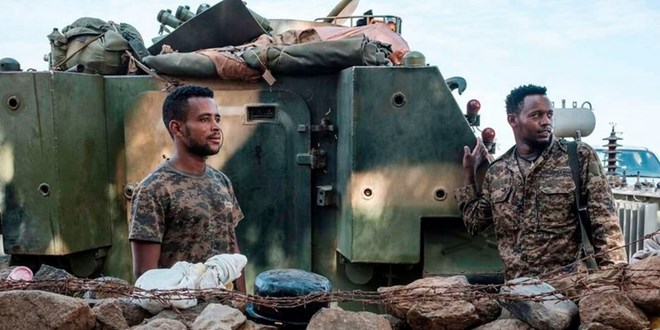
Ethiopia’s government said Thursday it was on the verge of victory in its year-long war against Tigrayan rebels and vowed to fight on, in an apparent rebuke of international ceasefire calls.
“This is not a country that crumbles under foreign propaganda! We are fighting an existential war!” the government’s communications office said on Facebook, following advances by rebel groups towards the capital.
advertisements
The combative statement could dampen hopes for a negotiated settlement between the government of Prime Minister Abiy Ahmed, winner of the 2019 Nobel Peace Prize, and the Tigray People’s Liberation Front (TPLF) rebel group.
It came on the first day of a two-day visit by Jeffrey Feltman, US special envoy for the Horn of Africa, that is intended to facilitate dialogue among the warring parties.
On Wednesday the TPLF announced it had reached the town of Kemissie in Ethiopia’s Amhara region, 325 kilometres northeast of Addis Ababa.
Spokesman Getachew Reda said the TPLF was working in the area alongside the Oromo Liberation Army rebel group, which on Wednesday predicted Addis Ababa could fall in a matter of weeks.
But Thursday’s statement from the government painted an entirely different picture of the current battlefield dynamic, saying the TPLF was “encircled” and close to defeat.
“A rat that strays far from its hole is nearer to its death,” the statement said, apparently referring to TPLF offensives that have advanced well beyond the northernmost Tigray region in recent months.
“Our people, realising that we are in the final chapter of saving Ethiopia, should continue their heroic struggle,” the statement said.
Lawmakers earlier Thursday endorsed a six-month state of emergency that could empower officials to conscript “any military age citizen who has weapons”.
“After a year of war, the Ethiopian conflict is at an incredibly dangerous point, with no side showing signs of backing down,” said William Davison, a senior analyst on Ethiopia with the International Crisis Group.
SWEDEN: Islamic school principal accused of embezzling student funds to Somalia
SWEDEN: Islamic school principal accused of embezzling student funds to Somalia

Source: Hiiran Online, Friday November 5, 2021
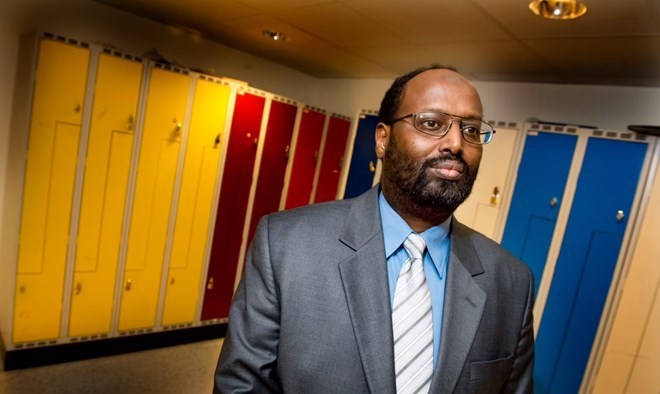
Abdirizak Waberi is accused of sending millions of kroner to Somalia to prop up his political party. Photo: Lars Pehrson / SvD / TT
Stockholm (HOL) – A former MP and head of a Swedish Muslim school in Gothenburg has been accused by Swedish authorities of embezzling millions of Swedish kroner from the school to his political party in Somalia.advertisements
Abdirizak Waberi, the leader of the National Unity Party in Somalia and former Swedish MP for the centre-right Moderate Party, is charged with serious financial crimes, according to chief prosecutor Henric Fagher.
Prosecutors suspected of Waberi and others at Römosseskolan, a Muslim independent school in Gothenburg, redirected SEK 13 million (£1.1 million/$1.5 million) that should have been used on local students to his political activities in Somalia.
“Some of it goes to his hotel and travel expenses abroad, a large part goes to two Somali organisations. One is said to be a relief organisation, the other a political party,” prosecutor Fagher said.
Waberi, the founder and longtime Principal, managed the school until this past summer.
He allegedly used fake invoices and other accounting frauds to cover his tracks.
Fagher says he is the subject of two ongoing investigations. Because of his extensive ties to Somalia, the court fears that Waberi will abscond and, as a result, has been forced to surrender his passport and must check in with Gothenburg police twice a week,
Waberi sat in Swedish Parliament for one term between 2010-2014.
He denies the allegations against him.
Ethiopia-US Relations: Podcast with Jeffrey Feltman
Ethiopia-US Relations: Podcast with Jeffrey Feltman
Source: The US Institute of Peace published a one hour podcast on 2 November 2021 with Jeffrey Feltman, the US Special Envoy for the Horn of Africa.
The focus of the the discussion was the humanitarian crisis in Ethiopia and the future of US-Ethiopia relations.
Labels: Abiy Ahmed, AGOA, Amhara Region, AU, civil war, Eritrea, Ethiopia, foreign policy, genocide, GERD, human rights, humanitarian crisis, Iran, sanctions, Sudan, Tigray Region, TPLF, Turkey, US
US tells citizens to consider leaving Ethiopia as rebels advance
US tells citizens to consider leaving Ethiopia as rebels advance

Source: AFP, Wednesday November 3, 2021
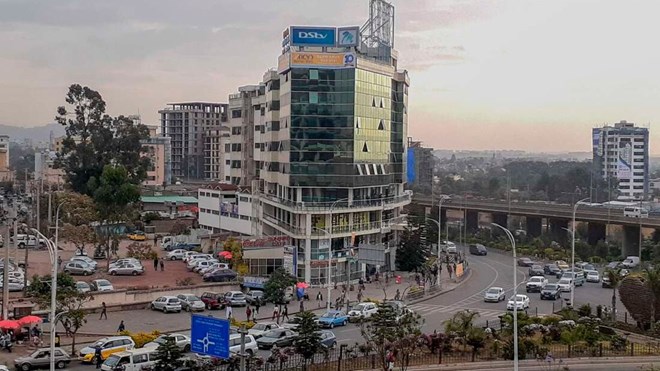
A view of Addis Ababa city. FILE PHOTO | CYRIL NDEGEYA | NMG
The US embassy in Ethiopia has urged its citizens to consider leaving the country.
The warning comes on the day Ethiopia declared a state of emergency as the Tigray People’s Liberation Front (TPLF) rebels captured more territory in the northern region.
The US embassy has also restricted its staff from travelling outside Addis Ababa city limits.advertisements
“We strongly suggest that US citizens seriously reconsider travel to Ethiopia and those who are currently in Ethiopia consider making preparations to leave the country,” it said in a statement.
“The security environment in Ethiopia has deteriorated significantly in the last several days with a continued escalation of armed conflict and civil unrest in Amhara, Afar and Tigray. A significant portion of the A2 highway connecting Addis Ababa with cities to the north has been restricted by Federal authorities which has led to disruptions, stranded travelers, and a generally non-permissive travel environment,” the US embassy cautioned.
Ethiopia has ordered residents of Addis Ababa to prepare to defend their neighbourhoods amid fears that Tigrayan rebels were heading for the capital.
This came after several days of reported advances by the Tigray People’s Liberation Front (TPLF) rebel group, which is locked in a brutal year-long war against Prime Minister Abiy Ahmed’s government.
“The state of emergency is aimed to protect civilians from atrocities being committed by the terrorist TPLF group in several parts of the country,” state-affiliated Fana Broadcasting Corporate reported.
Possible restrictions include a curfew, road closures and searches of “anyone suspected of collaborating with terror groups”, Fana said.
The measure also allows the authorities to conscript “any military age citizen who has weapons” or suspend any media outlets believed to be “giving moral support directly or indirectly” to the TPLF, Fana said.
Lawmakers were expected to approve the state of emergency within 24 hours, it added.
Earlier Tuesday officials in Addis Ababa announced new security measures for the city’s five million residents, requiring that all firearms be registered within two days.
“All residents must be organised by blocks and neighbourhoods to protect peace and security in their home area in coordination with security forces, who will coordinate activities with community police and law enforcers,” said Kenea Yadeta, chief of the city’s Peace and Security Administration Bureau.
He also said young residents would be recruited to work with law enforcement, and that “all sections of society” must cooperate with efforts to increase vigilance, for example landlords and hotel owners checking IDs of tenants and guests.
Rebel gains
Abiy sent troops into Tigray a year ago to detain and disarm the TPLF, in response, he said, to the group’s attacks on army camps.
The 2019 Nobel Peace laureate promised a swift victory, but by late June the rebels had regrouped and retaken most of Tigray.
They then launched offensives into the neighbouring regions of Afar and Amhara.
In recent days the TPLF has claimed control of two key cities in Amhara, about 400 kilometres (250 miles) north of Addis Ababa.
TPLF leaders have not ruled out marching on the capital, which has so far not seen any fighting.
The government has denied claims of TPLF territorial gains which, if confirmed, would represent a major strategic advance.
Much of northern Ethiopia is under a communications blackout and access for journalists is restricted, making battlefield claims difficult to verify independently.
A separate rebel group, the Oromo Liberation Army (OLA), has also boasted of recent advances in Amhara and in the Oromia region surrounding Addis Ababa.
US response
The international community has expressed alarm at the expanding conflict, with Western powers reiterating calls for an immediate ceasefire and for the African Union to broker peace talks between the warring parties.
The US embassy published an advisory late Tuesday suggesting citizens reconsider travelling to Ethiopia and that “those who are currently in Ethiopia consider making preparations to leave the country”.
The fighting has already killed thousands and forced hundreds of thousands into famine-like conditions, according to the UN.
Jeffrey Feltman, US special envoy for the Horn of Africa, said on Tuesday that Washington opposed “any TPLF move to Addis or any TPLF move to besiege Addis”, and that officials had conveyed that message to the rebels.
Separately US President Joe Biden said his government would remove Ethiopia from a vital trade pact due to human rights concerns related to the war.
Ethiopia, which in recent weeks had lobbied to stay in the programme, known as the African Growth and Opportunity Act, said it was “extremely disappointed” by Biden’s decision and called for its reversal.
Ethiopian prime minister vows to bury foes as state of emergency declared over Tigray conflict
thiopian prime minister vows to bury foes as state of emergency declared over Tigray conflict

Source: AP, Wednesday November 3, 2021
All sides in conflict have committed abuses, joint investigation into yearlong war in Tigray region finds
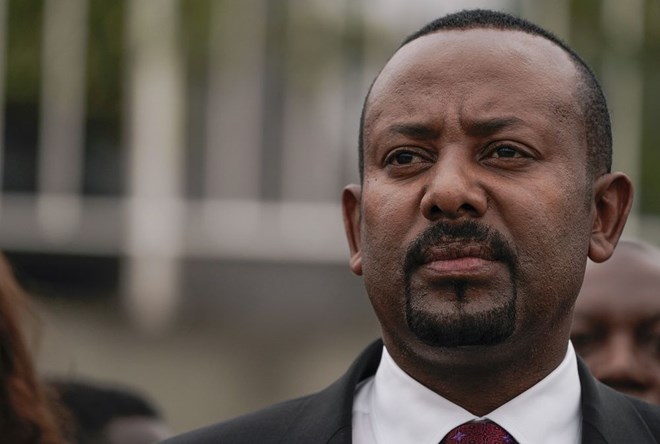
Abiy Ahmed Photographer: Jemal Countess/Getty Images
Ethiopian Prime Minister Abiy Ahmed pledged on Wednesday to bury his government’s enemies “with our blood” as he marked the start of the war in the Tigray region one year ago.
Abiy, who was awarded the Nobel Peace Prize in 2019, was speaking a day after a state of emergency was declared in the country and with Tigrayan forces threatening to advance on the capital Addis Ababa.advertisements
“The pit, which is dug, will be very deep, it will be where the enemy is buried, not where Ethiopia disintegrates,” he said in a speech at an event at the military’s headquarters in Addis Ababa.
“We will bury this enemy with our blood and bones and make the glory of Ethiopia high again.”
Abiy won the Nobel prize for settling Ethiopia’s longtime conflict with Eritrea.
Abiy’s comments came the same day that the UN human rights chief said Ethiopia’s war has been marked by “extreme brutality,” as a joint investigation into alleged atrocities faulted all sides for committing abuses, and “the big numbers of violations” are linked to Ethiopian forces and those from neighbouring Eritrea.
The investigation was hampered by authorities’ intimidation and restrictions and didn’t visit some of the war’s worst-affected locations. It said all combatants have committed abuses which may amount to crimes against humanity and war crimes.
The report, a rare collaboration by the UN human rights office with the government-created Ethiopian Human Rights Commission, was released a day before the war’s one-year mark and as Africa’s second-most populous country enters a new state of emergency with rival Tigray forces threatening the capital.
The UN told The Associated Press the collaboration was necessary for its team to gain access to a troubled region that Ethiopian authorities have largely prevented journalists, rights groups and other observers from entering.
The conflict that erupted in Ethiopia’s Tigray region has killed thousands of people since the government of Abiy allowed soldiers from Eritrea to invade Tigray and join Ethiopian forces in fighting the Tigray forces who long dominated the national government before Abiy took office. Ethnic Tigrayans across the country have since reported being targeted with arbitrary detentions while civilians in Tigray have described gang rapes, famine and mass expulsions.
In western Tigray, claimed by forces from the neighbouring Amhara region, “it was apparent that the Tigrayans had left most of the areas, as it was difficult to find Tigrayans to interview,” the report said.
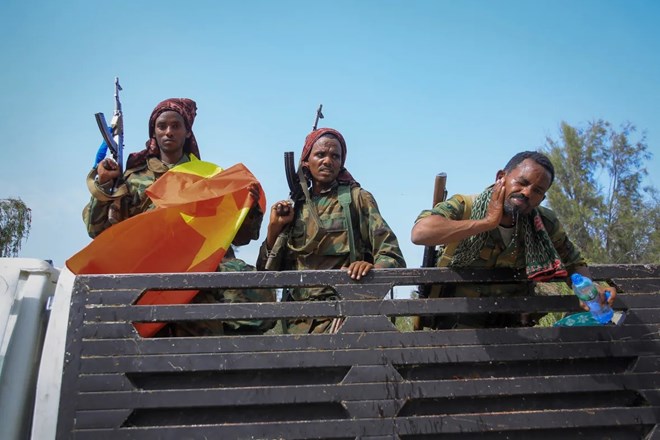
Tigrayan forces ride in a truck in June 2021 after they took control of Mekele. (The Associated Press)
The joint investigation covers events until late June when the Tigray forces regained much of their region, but it failed to visit some of the deadliest sites of the war, including the city of Axum, because of security and other obstacles. Notably, the report said, obstacles included the Ethiopian government’s failure to release satellite phones procured for the investigation — crucial tools as phone and internet service are cut off in Tigray.
The investigation breaks little new ground and confirms in general the abuses described by witnesses throughout the war. But it gives little sense of scale, saying only that the more than 1,300 rapes reported to authorities are likely far fewer than the real number.
Despite the report’s shortcomings, the prime minister’s office said in a statement that it “clearly established the claim of genocide as false and utterly lacking of any factual basis.” The Ethiopian Human Rights Commission chief Daniel Bekele said the investigation didn’t identify violations amounting to genocide, but the UN didn’t go that far.
The prime minister’s statement noted “serious reservations” about the report but claimed it laid “sinister allegations to rest.” And it acknowledged the need to “redouble our efforts” to hold perpetrators accountable. A high-level task force will be formed, it said.
Cases of torture
Among the investigation’s findings: Several Ethiopian military camps were used to torture captured Tigray forces or civilians suspected of supporting them. Others were detained in “secret locations” and military camps across the country, with detentions arbitrary in many cases. Tigray forces detained some ethnic Amhara civilians in western Tigray in the early days of the war on suspicion of supporting the military, and in some cases tortured them.
“The Tigray conflict has been marked by extreme brutality. The gravity and seriousness of the violations and abuses we have documented underscore the need to hold perpetrators accountable,” said Michelle Bachelet, the UN high commissioner for human rights. Reports of abuses such as summary executions in Tigray continue, she said.
And yet the report gives little sign that Eritrean soldiers were responsible for many of the atrocities, as witnesses have alleged. Until March, Ethiopia’s prime minister denied they were even in the country.
Bachelet told reporters that while the report doesn’t explicitly mention Ethiopian and Eritrean forces were responsible for the majority of the violations, “I would say that the big numbers of violations of human rights are linked to the Ethiopian and Eritrean defence forces.”
She also noted “disturbing suggestions of ethnically motivated violence” that warrant further investigation. She denied the probe came under government pressure.
Ethiopia’s government imposed a blockade on Tigray since the Tigray forces regained control in June, cutting off almost all access for commercial goods and humanitarian aid. That followed large-scale looting and destruction of food and crops that “has had a severe socioeconomic impact on the civilian population,” the report says. In addition, some camps for displaced people didn’t receive food rations for months.
The investigation, however, “could not confirm deliberate or wilful denial of humanitarian assistance to the civilian population in Tigray or the use of starvation as a weapon of war.” It called for further investigation.
Somali state cabinet passes a ‘self-defence’ resolution against TPLF ‘aggression’
Somali state cabinet passes a ‘self-defence’ resolution against TPLF ‘aggression’

Source: Hiiraan Online, Wednesday November 3, 2021
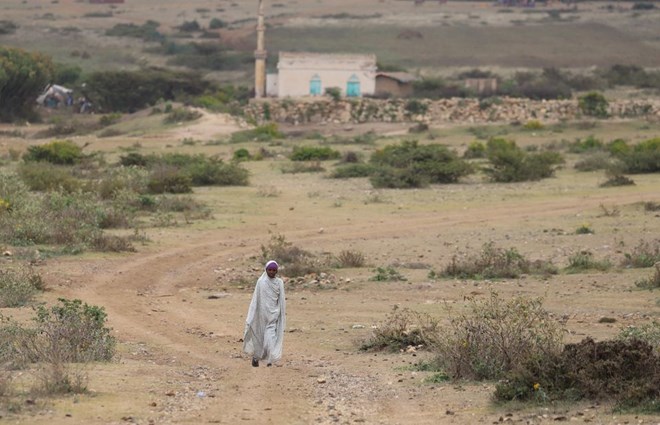
An internally displaced Ethiopian girl walks back to her village Sariir in Somali Region, Ethiopia January 13, 2020. REUTERS/Giulia Paravicini
MOGADISHU (HOL) – Somali state in Ethiopia Tuesday declared it would protect itself from the TPLF incursion as the war in the Horn of Africa nation nears the capital Addis Ababa.
In an extraordinary meeting Tuesday evening, the state cabinet passed a resolution to ‘to protect the self-rule of the Somali people’.advertisements
The cabinet also condemned what it termed as TPLF aggression and reiterated support to the federal government in ‘thwarting the return of yesterday’s reign of terror.’
The resolution comes amid a national call by Prime Minister Abiy Ahmed on Ethiopians to mobilize and protect the nation from the TPLF and declaration of a state of emergency nationwide.
Abiy Ahmed also defended his decision to take the war to TPLF last year, noting that the assault on the Northern Command in the Tigray region necessitated the response.
TPFL presidential advisor Getachew Reda dismissed the state of emergency order terming it a blank cheque for jail and kill.
The Tigray Defence Forces (TDF) have since captured Kombolcha and Dessie, which are about 400km to the capital Addis Ababa.
Biden administration dispatches senior officials to Somalia to bolster war against Al-Shabaab
Biden administration dispatches senior officials to Somalia to bolster war against Al-Shabaab

Source: Hiiraan Online, Sunday October 31, 2021
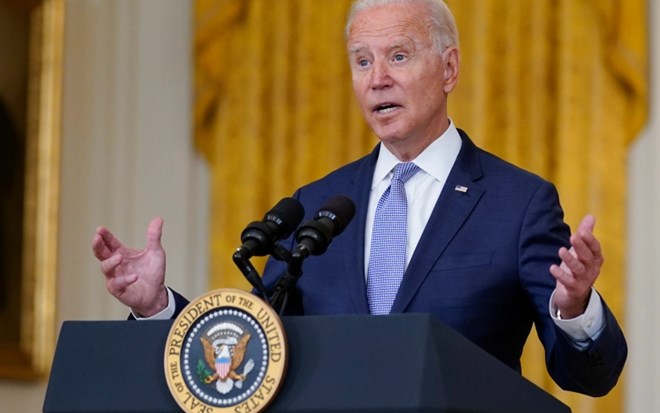
NAIROBI (HOL) – Senior Biden administration officials visited Somalia this week in what the White House said was aimed at bolstering the war against Al-Shabaab.
advertisements
According to a statement from the White House, Assistant to the President for Homeland Security Dr. Liz Sherwood-Randall, USAFRICOM Commander General Stephen Townsend, and Assistant Secretary of Defense for Special Operations and Low-Intensity Conflict Chris Maier visited Somalia, Djibouti and Kenya this past week.
“The trip focused on advancing the Biden Administration’s counterterrorism policy in an evolving threat landscape: prioritizing the most dangerous and ascendant threats; empowering local partners to prevent and counter terrorist threats within their own borders; and working multilaterally with regional and international allies and partners to pursue our broader security, governance, and development goals across the region,” the statement read in part.
The visit comes amid increased Al-Shabaab attacks in the Somalia amid an ongoing election. The US pulled out its troops from Somalia early 2020 but has been conducting aerial strikes against Alshabaab and ISIS targets.
“In East Africa, Dr. Sherwood-Randall, General Townsend, and Mr. Maier met with U.S. forces in Djibouti, Somalia, and Kenya who are responsible for executing the counterterrorism campaign against al-Shabaab in conjunction with local and regional partners, the statement added.
Climate and Environment
26 October 2021Climate and Environment
If you’ve been following the UN for any period of time, you will quickly notice the plethora of acronyms, initialisations and jargon that abound across the Organization. There will be plenty more to confuse you at COP26 (a classic example in itself), so here’s our handy guide to help you make sense of some of the key buzz words you’ll be hearing, as the landmark climate change conference gets going.
COP26
Let’s start with the name of the event itself, COP26. In layman’s terms, this is the 26th UN climate change conference, but officially it is the 26th Conference of the Parties (or COP) to the UN Framework Convention on Climate Change (UNFCCC). Let’s break that down a bit…
The UNFCCC was established following the 1992 UN Conference on Environment and Development in Rio (often referred to as the Earth Summit). The stated aim of the UNFCCC was to reduce greenhouse gases in order to prevent dangerous climate change caused by human activity.
Conferences of the Parties to the convention, or COPs, are the formal meetings that have taken place every year since 1995, apart from 2020: the COVID-19 pandemic meant that COP26 was delayed by a year.
SDG
There are 17 inter-linked Sustainable Development Goals, or SDGs, which focus on challenges ranging from clean energy access, to poverty reduction and responsible consumption.
Together, the SDGs make up the 2030 Agenda for Sustainable Development, the UN’s blueprint for peace and prosperity for people and the planet.
Climate Change is one of the Goals (SDG 13), but t’s becoming increasingly clear that climate change plays a role in many, if not all of the SDGs, and that achieving the 2030 Agenda will be impossible without making serious inroads into tackling the problem.https://www.youtube.com/embed/0XTBYMfZyrM?enablejsapi=1&origin=https%3A%2F%2Fnews.un.org
NDC
This stands for Nationally Determined Contribution, the detailed plan that individual countries are required to make, under the Paris Agreement, to show how they will cut the amount of harmful greenhouse gases they emit. All countries are expected to revise their NDC to reflect greater ambition.
Presently, these plans are not sufficient to keep global warming to 1.5° Celsius above pre-industrial levels, so this year, there is increased pressure on countries to sharply increase their level of ambition.
Net Zero
Put simply, net zero means cutting emissions to as close to zero as possible, such as by moving toward a green economy and clean renewable energy, with any remaining emissions reabsorbed, including oceans and forests.
Practically every country has joined the Paris Agreement on climate change, which calls for keeping the global temperature to 1.5°C above pre-industrial era levels.
If we continue to pump out the emissions that cause climate change, however, temperatures will continue to rise well beyond 1.5, to levels that threaten the lives and livelihoods of people everywhere.
This is why a growing number of countries are making commitments to achieve “net zero” emissions by 2050. It’s a big task, requiring ambitious actions starting right now.
1.5°C
You’ll be hearing “the goal of 1.5 degrees Celsius” a lot during COP. In a 2018, an IPCC report, reviewed by thousands of scientists and governments, found that limiting global temperature rise to no more than 1.5°C above pre-industrial levels (in the mid-18th century), would help us avoid the worst climate impacts and maintain a liveable climate.
According to the latest data, our world has already warmed between 1.06 to 1.26 above pre-industrial levels, and even if current promises are met, we would still be on a course to reach 2.7°C this century. This would mean a “climate catastrophe” as highlighted by the UN Secretary-General, with a possible collapse of ecosystems, and life as we know it.
IPCC
The Intergovernmental Panel on Climate Change (IPCC) is the UN body for assessing the science related to climate change.
Created in 1988 by the World Meteorological Organization (WMO) and the UN Environment Programme (UNEP), the objective of the IPCC is to provide governments at all levels with scientific information that they can use to develop climate policies.
IPCC reports are also a key input into the international climate change negotiations that will be happening during COP26. A major report released in August showed that unless there are rapid, sustained and large-scale reductions of greenhouse gas emissions, including CO2, methane and others, the goal of limiting global warming to 1.5C will be beyond reach.
SIDS
Small Island Developing States are a distinct group of 58 low-lying island nations that are highly vulnerable and often affected by weather extremes and climate change, including the increased severity of cyclones, storm surges, heavy rains, droughts, sea-level rise and ocean acidification.
During the latest high-level week of the General Assembly, SIDS leaders from Fiji, Tuvalu and the Maldives took centre stage saying their nations are facing an existential threat if rich countries fail to make good on their promises to turn the tide on global warming. UN Photo/Rick BajornasAerial view of damage caused by Hurricane Irma in Antigua and Barbuda (2017).
UN Photo/Rick BajornasAerial view of damage caused by Hurricane Irma in Antigua and Barbuda (2017).
Climate finance
Broadly speaking, climate finance relates to the money which needs to be spent on a whole range of activities to reduce the emissions that are causing climate change, and to help people adapt to and build resilience for the impacts of climate change that are already occurring.
It can involve local, national, or transnational financing, which may be drawn from public, private and alternative sources of financing. Climate finance is critical to addressing climate change, because large-scale investments are required to significantly reduce emissions, notably in sectors that emit large quantities of greenhouse gases, and to help adaptation efforts.
In 2009, during the COP15 in Copenhagen rich nations promised to channel $100 billion a year to less-wealthy nations by 2020, to help them adapt to climate change and mitigate further rises in temperature.
The promise still hasn’t been delivered—climate finance to developing countries presently amounts to about $80 billion–, and therefore climate finance will be one of the biggest issues of discussion during COP26.
SBTi
This stands for the UN-backed Science Based Target initiative. Companies which sign up to the initiative set science-based emission reduction targets, which leave them better equipped to tackle climate change, and making them more competitive, in the transition to a net-zero economy.
Science-based target setting has become a standard business practice, and corporations are playing a major role in driving down global greenhouse gas emissions and in supporting the implementation of country commitments.
Nature-based Solutions
Nature-based Solutions are actions to protect, sustainably manage, and restore natural and modified ecosystems that address societal challenges effectively and adaptively, simultaneously providing human well-being and biodiversity benefits.
Nature-Based Solutions are an essential part of the overall global effort to achieve the goals of the Paris Agreement on Climate Change: they are a vital complement to decarbonisation, reducing climate change risks and establishing climate resilient societies.
Examples include massive tree planting programmes, which absorb carbon and provide protection from intense rainfall, and rebuilding mangroves, which provide effective and cheap natural barriers against coastal floods and shoreline erosion.https://www.youtube.com/embed/oKPgtdH26RU?rel=0&enablejsapi=1&origin=https%3A%2F%2Fnews.un.org
G20
The Group of 20 (G20) is an intergovernmental forum comprising most of the world’s largest economies: 19 nations and the European Union. They work to address major issues related to the global economy, such as international financial stability, climate change mitigation, and sustainable development.
The UN Secretary-General has made clear that climate action must be led by G20 nations, which collectively account for around 90 per cent of gross world product, 75-80 per cent of international trade and two thirds or the world’s population.
Their commitment during COP26 is crucial for curbing greenhouse gases and stop fuelling climate change.
AGN
The African Group of Negotiators on Climate Change (AGN) was established at COP1 in Berlin, Germany in 1995 as an alliance of African member states that represents the interests of the region in the international climate change negotiations, with a common and unified voice.
GCAA
Outside the formal intergovernmental negotiations, countries, cities and regions, businesses and civil society members across the world are already taking action for the climate.
The Global Climate Action Agenda (GCAA), initiated under the Lima Paris Action Agenda, was launched to spur rapid climate action, boost cooperation between governments, local authorities, the business community, investors, and civil society, and to support the adoption and the implementation of the Paris Agreement.
UN News is producing special coverage from COP26 in Glasgow. You can find all our COP-related stories here.
♦ Receive daily updates directly in your inbox – Subscribe here to a topic.♦ Download the UN News app for your iOS or Android devices.
Sudanese Generals Stiff US
Sudanese Generals Stiff US
Ssource: Foreign Policy posted on 26 October 2021 an analysis titled “Sudanese General Blew Off Final U.S. Effort to Avert Power Grab” by Robbie Gramer.
The article describes the visit last week to Sudan by US Special Envoy Jeffrey Feltman and his efforts to avert a power grab by Sudan’s military. Within hours of his departure, Sudanese General Abdel Fattah al-Burhan arrested civilian Prime Minister Abdalla Hamdok and seized power in Khartoum.
Labels: Abdalla Hamdok, Abdel Fattah al-Burhan, Biden administration, coup d’etat, Egypt, Jeffrey Feltman, Mohamed Hamdan Dagalo, protests, sanctions, Saudi Arabia, Sudan, UAE, US
Tigrayan forces say they have seized strategic town in Ethiopia’s Amhara region
Tigrayan forces say they have seized strategic town in Ethiopia’s Amhara region

Source: Reuters, Saturday October 30, 2021
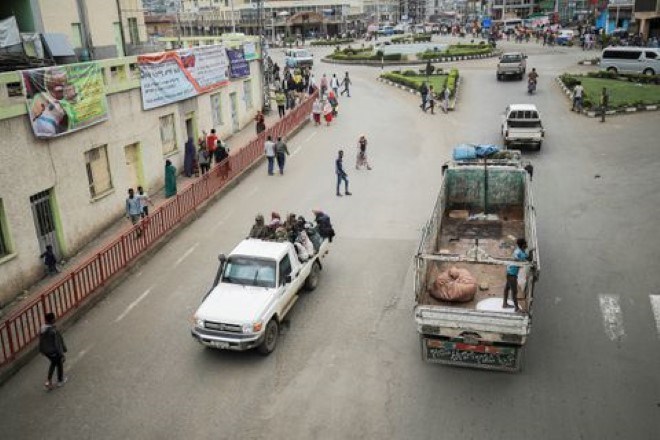
Members of the Amhara Militia patrol on the streets in Dessie town, Amhara Region, Ethiopia, October 9, 2021. REUTERS/Tiksa Negeri
ADDIS ABABA, Oct 30 (Reuters) – Rebellious Tigrayan forces said on Saturday they had seized the strategic town of Dessie in Ethiopia’s Amhara region where tens of thousands of ethnic Amharas have sought refuge from an escalation in fighting.
The fighters pushed Ethiopian government forces from Dessie and were headed towards the town of Kombolcha, Getachew Reda, spokesperson for the Tigray People’s Liberation Front (TPLF), told Reuters by satellite phone from an undisclosed location.advertisements
He said Tigrayan forces had captured numerous Ethiopian soldiers.
Legesse Tulu, the Ethiopian government spokesperson, did not immediately respond to requests for comment. Reuters could not independently verify the TPLF’s account of developments.
A school director in Dessie said he saw Ethiopian soldiers retreating from the town on Saturday morning towards Kombolcha and that power across town had been off since Friday.
Another resident of Dessie also said the town had no power and that the federal army had left. Both said they had heard Tigrayan fighters were in town but had not seen them. Both residents spoke on condition of anonymity.
The capture of Dessie would be a strategic gain for the Tigrayan fighters against the central government forces who are trying to dislodge them from the Amhara region.
The large town is some 385 km (240 miles) from the capital, Addis Ababa, and is the furthest south in Amhara that the TPLF has reached since pushing into the region in July.
War broke nearly a year ago between federal troops and the TPLF. Thousands of people have been killed and more than 2 million people have been forced to flee.
Tigrayan forces were initially beaten back, but recaptured most of the region in July and pushed into the neighbouring Amhara and Afar regions.
In mid-October, the Tigrayan forces said the military had launched a ground offensive to push them out of Amhara. The military said on Thursday there was heavy fighting there, but accused the Tigrayan forces of starting it.
Reporting by Addis Ababa newsroom Editing by Mark Heinrich, Alison Williams and Frances Kerry



